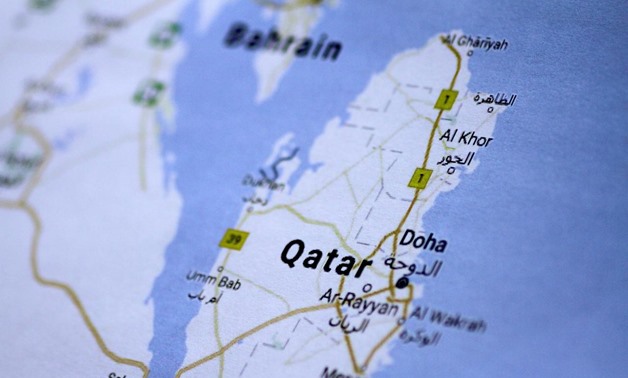
A map of Qatar, June 5, 2017. REUTERS/Thomas White/Illustration
CAIRO – 16 December 2017: Ordinary Qataris and migrants living in Qatar are negatively affected by the Arab boycott imposed by Egypt, Saudi Arabia, the United Arab Emirates and Bahrain over Doha’s funding of terrorist groups, according to Amnesty International.
Qatari families are affected by the intra-Arab rift despite measures to ease the impact of the crisis on ordinary citizens, an Amnesty report stated on Thursday.
Six months ago, the four Arab countries imposed travel, economic and diplomatic sanctions on Qatar in June over accusations of supporting terrorism, which Doha denies. Qatar is also accused of colluding with the Persian state of Iran which threatens its Gulf neighbors. According to the Amnesty report, thousands of Qataris have been affected by the rift, which has split families, raised food prices for foreign workers and made sacred trips to Saudi Arabia more difficult.
Qatar is seeking to increase bilateral trade with Iran, the Qatari Minister of Economy Ahmed bin Jassim Al-Thani stated in a meeting with Iranian Minister of Industries, Mining and Trade Mohammad Shariatmadari in Tehran in November.
Doha insists on defying Arabs’ demands to cut ties with Tehran, instead it is currently seeking to increase its economic and bilateral trade with Iran.
“The bilateral interactions between the two sides have significantly increased during the last few months,” the Qatari minister added in November.
Iran and Qatar have been forging stronger economic ties ever since Arab countries, led by Egypt and Saudi Arabia, severed diplomatic relations with Doha in early June, accusing it of supporting terrorist groups.
"Iran is playing an important role in the transport of goods from Turkey and Azerbaijan to Qatar," the Qatari minister added.
“In the past seven months, Iran has exported $97 million [worth] of goods and just less than $1 billion [worth] of technical and engineering services to Qatar,” he added.
Notably, Iran's exports to Qatar saw significant growth in October. Qatar has suggested that they want to reach the common trade value of up to $5 billion in the future.
Qatari Foreign Minister Sheikh Mohammed bin Abdulrahman Al-Thani stated in September that the Arab economic boycott with Qatar is pushing it to become closer to Iran economically.
“Qatar has turned to new destinations to import food, which has had the effect of increasing food prices. Data published by the Qatari government in November shows that in October 2017 the price of food and drinks was 4.9% higher than in the same month in 2016,” the Amnesty report added.
Diplomatic efforts led by Kuwait to resolve the dispute have so far failed to narrow the gap between the two Arab camps; Qatar on one side and the Arab Quartet on the other. Although Qatar’s Tamim bin Hamad Al-Thani attended the last GCC summit in Kuwait, other GCC heads did not because of speculations that Qatar only accepted some, not all, the Arab demands, which the Arab quartet rejected.
The tiny Gulf state insists on defying its people’s interests by keeping close ties with the Persian republic of Iran and Hezbollah militias. If Tamim cares about his people, he would cut ties with terrorist groups and extremists that Doha supports and finances, experts have said.

Comments
Leave a Comment